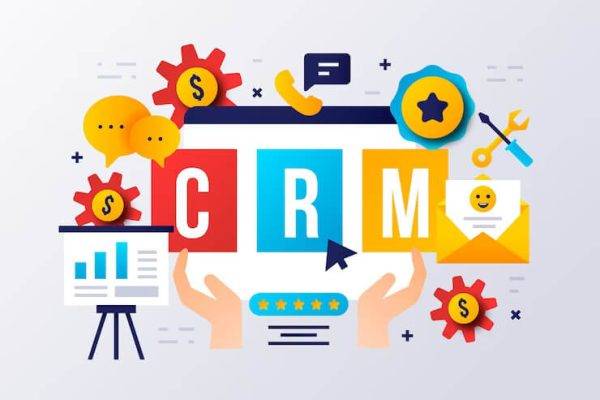In today’s highly competitive business landscape, companies are constantly looking for ways to gain an edge over their competitors. One of the key ways to achieve this is by improving customer satisfaction and streamlining customer interactions. This is where a Customer Relationship Management (CRM) system comes in.
A CRM system is a powerful tool that can help businesses of all sizes manage their interactions with customers, from the first point of contact to ongoing support and service. By centralizing customer data and automating certain processes, a CRM system can help businesses improve their customer service, increase sales, and grow their bottom line.
Whether you’re a small business owner or a large enterprise, understanding the benefits of a CRM system can help you make informed decisions about your technology investments and drive growth for your business.
So, let’s explore How important is CRM today.
1. Helps Companies to Stay in Touch With the Customers
It helps companies to keep track of their customers, understand their needs and behavior better, know about the preferences of each customer, etc.
A well-implemented CRM system can help companies stay in touch with their customers in many ways, including
- Centralizing customer data: A CRM system allows companies to store and organize customer data in a centralized location, making it easier to access and analyze. This helps companies understand their customer’s behavior, preferences, and needs, enabling them to personalize their interactions and communication.
- Automating customer communication: It can automate various customer communications, such as email campaigns, chatbots, and social media interactions. Companies can respond quickly and efficiently to customer inquiries, requests, and feedback by automating these processes.
- Providing customer insights: It can generate valuable insights about customer behavior and trends. By analyzing this data, companies can identify areas for improvement and create strategies to enhance the customer experience.
- Facilitating customer engagement: It can help companies stay in touch with customers by providing various engagement tools such as newsletters, surveys, webinars, and social media. These tools help companies establish a strong relationship with their customers, enhance their loyalty, and generate repeat business.
- Improving customer service: It helps companies provide better customer service by enabling quick and accurate access to customer data, transaction history, and other relevant information. This helps companies resolve customer issues faster and improve their overall experience.
2. Helps the Sales Team Focus on High-value Leads
If you’re a sales team, there are several ways that CRM can help you focus on high-value leads and customers. You can:
- Focus on high-value leads: The CRM system will keep track of all your lead data so that you have an up-to-date picture of who your best customers are and how they use your product or service. This information allows you to target them better with personalized offers and special offers than those given out by competitors. It also makes it easier for salespeople to follow up with these prospects. Because they know exactly what questions need answering before moving forward with any type of communication (email, phone call).
- Focus on high-value prospects: With this information in hand, it becomes much easier for salespeople to not only identify new accounts worth pursuing but also understand exactly why each account fits within their company’s goals. Whether or not certain features might be beneficial for future campaigns against those same prospects.
- Focus on high-value accounts: Once identified as such by their lead scoring algorithms based on similar behaviors over time. These accounts become more valuable since they provide consistent revenue streams over time without having too many factors affecting their performance such as seasonal trends or industry trends.
3. Allows you to See That the Customer is Interested in Your Product
CRM solutions will enable you to see that the customer is interested in your product. This can be done by tracking their behavior and usage of your product, as well as how they found out about it.
You can also use this information to target specific audiences based on their needs and interests. When they find out about your brand or start using it. They’ll be more likely to buy again.
Just because someone has expressed interest doesn’t mean they’ll actually buy something though! If someone signs up for an account but never buys anything from you again after that initial purchase (or if they move on to another company), then there’s no point in having them on board at all.—they might as well have never signed up at all!
In order not to go down this path too often though: keep track of what happens when users sign up. So, retention becomes easier over time (and less expensive).
4. Improves the Quality of Service and Reduces Cost
CRM can help to increase customer satisfaction, reduce churn and costs and increase revenue.
CRM helps to ensure that you are providing your customers with good customer service by collecting data on their past experiences with you. This will give you a better understanding of what they want from your business and how to fulfill those needs.
You can use this information to improve the way in which you deliver services or products. It gives you insights into how well-liked or disliked certain products are within different markets around the world!
5. Data Overload
You may be facing a challenge. Maybe there’s too much data to process and analyze, or you simply don’t have the resources to do so. Either way, CRM can help you focus on the most important information in your company’s system. So, it doesn’t become outdated or irrelevant.
This is especially important if you work with multiple departments within an organization. For example, sales reps need access to customer information but also have their own databases built up over time.
- Centralizing Data: CRM systems can centralize data from various sources, including sales, marketing, customer service, and social media, into a single database. This can help reduce data overload by making it easier to access and manage data from a single location.
- Automating Data Collection: It can automate data collection, reducing the manual effort required to enter and manage data. This can help reduce errors and improve data accuracy, making it easier to analyze and use.
- Filtering Data: CRM systems can filter data based on specific criteria, such as customer demographics or purchase history. This can help reduce data overload by presenting only the most relevant data, making it easier to identify patterns and trends.
- Analyzing Data: It can analyze data to provide insights into customer behavior, preferences, and needs. This can help reduce data overload by providing actionable information that can be used to improve marketing and sales efforts.
- Personalizing Communication: It can personalize communication with customers based on their preferences and past interactions. This can help reduce data overload by streamlining communication and ensuring that messages are relevant and timely.
6. Unclear Priorities
The biggest problem with CRM is that priorities are set by the customer, not you. For example, if your customers have a long list of requests and you don’t have time to do all of them but they still expect you to deliver something every month or two. There’s no way for either party (you or them) to know what is most important at any given moment.
This can lead to frustration on both sides. If your customer feels that their needs aren’t being met because they’re too busy trying to solve problems with other people in their organization. It’s hard for you as an employee not knowing how much time each request actually takes up vs others’ priorities (or lack thereof).
CRM can help clarify priorities in several ways, including
- Analyzing customer behavior: With a CRM system in place, businesses can track customer behavior and interactions, such as website visits, email opens, and social media interactions. This information can be used to identify patterns and trends in customer behavior and preferences, which can help businesses understand their customers’ priorities.
- Segmentation and targeting: It can also help businesses segment their customer base and target specific groups of customers with personalized marketing messages. By tailoring marketing messages to the specific needs and preferences of different customer segments, businesses can more effectively prioritize their marketing efforts.
7. Lack of Alignment Between Departments
The first thing to consider is whether there’s a lack of communication between departments. If your team doesn’t know what the other teams are doing, it’s hard to make decisions or share ideas. This can lead to a lot of wasted time and money if you’re not getting in sync with each other.
It’s also hard for people at different levels in your organization—such as C-level executives and sales managers—to get information from one another about how things are going.
Because no one has been given authority over their specific area or function yet; this means that they don’t have access to data about how well things are going or what could be improved upon before making changes themselves.
CRM software can help in addressing the lack of alignment between departments by providing a centralized system for tracking customer interactions and information.
Here are some ways in which CRM can help:
- Improved communication: With a CRM system in place, departments can easily share customer data and insights with one another, improving communication and alignment across teams. This can reduce the chances of misunderstandings and enable more effective collaboration.
- Consistent data: It can provide a single source of truth for customer information, helping to ensure that all departments are working from the same data. This can help to eliminate confusion or disagreements that may arise from different teams working with different versions of customer data.
- Better visibility: It provides a 360-degree view of the customer, which can be shared across departments. This can help teams understand the full context of a customer’s interactions and provide a more personalized experience.
- Workflow automation: A CRM system can automate routine tasks and workflows, reducing the workload on each department and ensuring that everyone is working on the same set of priorities. This can help to align teams around common goals and make sure that everyone is moving in the same direction.
- Real-time reporting: It provides real-time reporting, enabling departments to monitor key metrics and track progress toward goals. This can help to identify issues early and enable teams to take corrective action before they become bigger problems.
8. Unfocused Sales Teams
Salespeople need to be focused on the right things. They have to know what your customers are interested in, and they have to know what you’re interested in as a company. They also need to be able to see what their customers want and need. So, they can provide it for them.
This is hard enough for salespeople who are not using CRM software; imagine trying this without access!
A CRM can help unfocused sales teams in several ways. Here are a few ways:
- Provides a Centralized System: A CRM system can provide a centralized location for all customer data, including contact information, communication history, and previous interactions. This can help unfocused sales teams to stay organized and have all the necessary information in one place.
- Automated Task Management: It can help unfocused sales teams to stay on track by providing task management tools. Tasks can be automatically assigned, reminders can be set up, and progress can be tracked. This can help keep sales teams focused on their goals and ensure that important tasks don’t slip through the cracks.
- Better Communication: It can also help sales teams to communicate more effectively with their customers. By keeping track of communication history, salespeople can quickly review previous conversations and better understand their customers’ needs.
- Sales Forecasting: A CRM system can help unfocused sales teams to plan their activities accordingly. By analyzing historical data and identifying trends, sales teams can make more informed decisions about where to focus their efforts and which customers to prioritize.
9. Poor customer care
CRM helps organizations to manage their interactions with customers and improve customer satisfaction. By implementing a CRM system, organizations can collect, store, and analyze customer data, which can be used to improve their customer care.
Here are some ways in which CRM can help to improve poor customer care:
- Personalization: By using customer data, organizations can personalize their interactions with customers, such as by addressing them by name or offering products and services that are relevant to their interests. This can improve customer satisfaction and loyalty.
- Proactive customer service: With a CRM system, organizations can track customer complaints and issues, and respond to them proactively. This can help to prevent problems from escalating and improve customer satisfaction.
- Efficient communication: It can help organizations communicate with customers more efficiently, such as by sending targeted marketing messages or automated responses to common customer inquiries. This can help to reduce response times and improve customer satisfaction.
- Improved analytics: By analyzing customer data, organizations can gain insights into the effectiveness of their customer care strategies and make data-driven decisions to improve them.
Why HubSpot CRM for Your Business?
HubSpot CRM is a popular choice for businesses of all sizes because it offers a wide range of powerful features and benefits.
Here are a few reasons why HubSpot CRM might be the right choice for your business:
- User-friendly interface: HubSpot CRM has a simple and intuitive user interface that makes it easy for anyone to use, regardless of their technical background. This means that your team can quickly get up to speed and start using the tool to manage customer relationships and improve sales.
- Centralized customer data: With HubSpot, all customer data is stored in a centralized database, which makes it easy to access and update information across your entire organization. This can help your team stay organized and ensure that everyone has the latest information about your customers.
- Automation and customization: It offers a wide range of automation and customization features, which can help you streamline your sales and marketing processes. For example, you can create email templates, set up automated workflows, and create custom reports to track key metrics.
- Integrations: It integrates with a wide range of other business tools, including marketing automation software, social media platforms, and customer support software. This means that you can connect your CRM to other tools you already use, making it even more powerful and versatile.
- Scalability: Whether you’re a small business just starting out or a large enterprise with complex needs, HubSpot CRM can scale to meet your needs. The tool is designed to grow with your business, so you can start with the features you need today and add more functionality as your needs change over time.
Conclusion
So, how important is CRM today? In short, it’s essential. As more and more businesses realize the benefits of customer-centricity and the role that technology can play in achieving it, CRM is becoming an increasingly important part of their toolkit. Whether you’re a small business just starting out or a large enterprise with complex needs, investing in a CRM system can help you to stay competitive, grow your customer base, and achieve long-term success.
Sign Up for HubSpot CRM and take your entire business process to the next level. FREE trial available.





